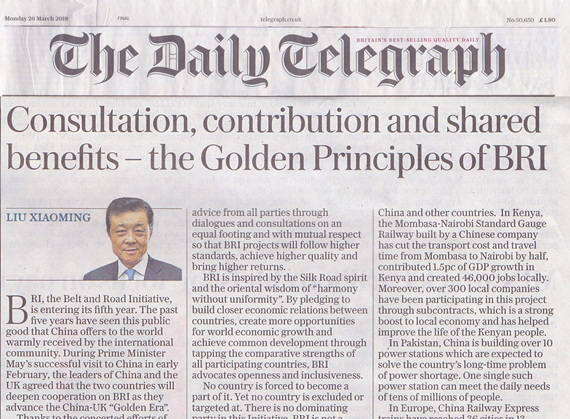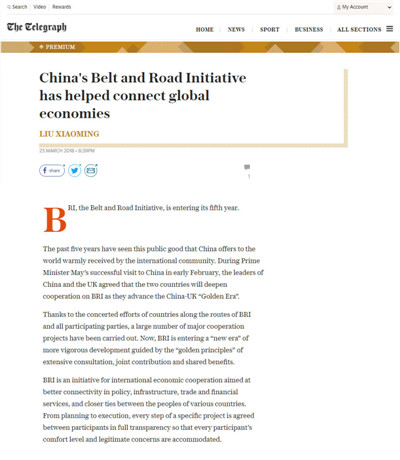The Daily Telegraph Publishes a Signed Article by Ambassador Liu Xiaoming Entitled Consultation, Contribution and Shared Benefits -- the Golden Principles of BRI


On 26 March 2018, the Daily Telegraph and its website published a signed article by Ambassador Liu Xiaoming entitled Consultation, Contribution and Shared Benefits -- the Golden Principles of BRI. The full text is as follows:
BRI, the Belt and Road Initiative, is entering its fifth year. The past five years have seen this public good that China offers to the world warmly received by the international community. During Prime Minister May's successful visit to China in early February, the leaders of China and the UK agreed that the two countries will deepen cooperation on BRI as they advance the China-UK "Golden Era".
Thanks to the concerted efforts of countries along the routes of BRI and all participating parties, a large number of major cooperation projects have been carried out. Now, BRI is entering a "new era" of more vigorous development guided by the "golden principles" of extensive consultation, joint contribution and shared benefits.
BRI is an initiative for international economic cooperation aimed at better connectivity in policy, infrastructure, trade and financial services, and closer ties between the peoples of various countries. From planning to execution, every step of a specific project is agreed between participants in full transparency so that every participant's comfort level and legitimate concerns are accommodated.
Many BRI participants are developing countries in need of financing and technical support in building their infrastructure and see the Initiative as rain on thirsty land. Take the China-Kyrgyzstan-Uzbekistan highway for example. Its opening earlier this year has shortened the travel time between Xinjiang of China and Tashkent of Uzbekistan from 10 days to three. This, plus greatly streamlined customs clearance procedures, is expected to reduce freight charges by 300 to 500 dollars per ton and create over one million jobs along the highway.
BRI follows market rules and internationally accepted practice, seeking to harmonize economic, social, financial and environmental objectives for comprehensive returns and sustainability of projects. In fact, the BRI connectivity refers to not only "hardware connectivity" involving infrastructure, but also "software connectivity" of rules and standards.
China welcomes suggestions and advice from all parties through dialogues and consultations on an equal footing and with mutual respect so that BRI projects will follow higher standards, achieve higher quality and bring higher returns.
BRI is inspired by the Silk Road spirit and the oriental wisdom of "harmony without uniformity". By pledging to build closer economic relations between countries, create more opportunities for world economic growth and achieve common development through tapping the comparative strengths of all participating countries, BRI advocates openness and inclusiveness.
No country is forced to become a part of it. Yet no country is excluded or targeted at. There is no dominating party in this Initiative. BRI is not a "zero-sum game".
The Belt and Road Initiative was proposed by China, but it is open to all countries in the world to join and to share the benefits. Even African and Latin American countries far away from China have become active participants of BRI, working together to gather impetus for growth and open new prospects for common development.
Last May, representatives from over 140 countries and international organizations attended the Belt and Road Forum for International Cooperation in Beijing. That was a clear show of trust in and support for the Initiative. So far over 80 countries and international organizations have signed agreements with China on jointly building the Belt and Road.
During Prime Minister May's visit to China, the leaders of the two countries agreed to expand, elevate and deepen cooperation on the Belt and Road Initiative, with a view to promoting regional and global economic growth. This agreement is a strong boost to the Belt and Road cooperation between the two countries.
A Chinese adage goes, to give is to gain, and to share is to gain more. This has been the thrust of the win-win philosophy of the Chinese people since ancient times. BRI is China's invitation for the world to share the dividends of its rapid growth. Five years of progress of this Initiative has produced numerous win-win projects between China and other countries.
In Kenya, the Mombasa-Nairobi Standard Gauge Railway built by a Chinese company has cut the transport cost and travel time from Mombasa to Nairobi by half, contributed 1.5% of GDP growth in Kenya and created 46,000 jobs locally. Moreover, over 300 local companies have been participating in this project through subcontracts, which is a strong boost to local economy and has helped improve the life of the Kenyan people.
In Pakistan, China is building over ten power stations which are expected to solve the country's long-time problem of power shortage. One single such power station can meet the daily needs of tens of millions of people.
In Europe, China Railway Express trains have reached 36 cities in 13 European countries, including London which welcomed the first train from Yiwu of China last year. Of over 6,000 trains between Chinese and European cities in the past seven years, there were 3,673 trains last year alone, more than the total number in six previous years. These trains have made Chinese and European goods more easily available to each other at a lower cost.
This year marks the 40th anniversary of China's reform and opening up. China will take more concrete steps in its reform and open its door wider to the world. One testament to this commitment is the first-ever China International Import Expo to be held in Shanghai this November. This Expo is open to companies from all countries, including the UK, who wish to introduce their high-quality products and services to China and the rest of the world.
In working with other countries, China takes a balanced approach to principles and interests, and puts principles before interests. In BRI development, the overarching principles are equality, openness and inclusiveness. It is the whole world, rather than China alone, that will benefit from the Initiative.
China and the UK share a strong willingness to cooperate on the Belt and Road Initiative. The two countries enjoy comparative industrial advantages and broad prospects for cooperation. There is every reason for the two countries to seize the time and strive to take the BRI cooperation onto a new stage and deliver more "golden fruits" in the China-UK "Golden Era".




































